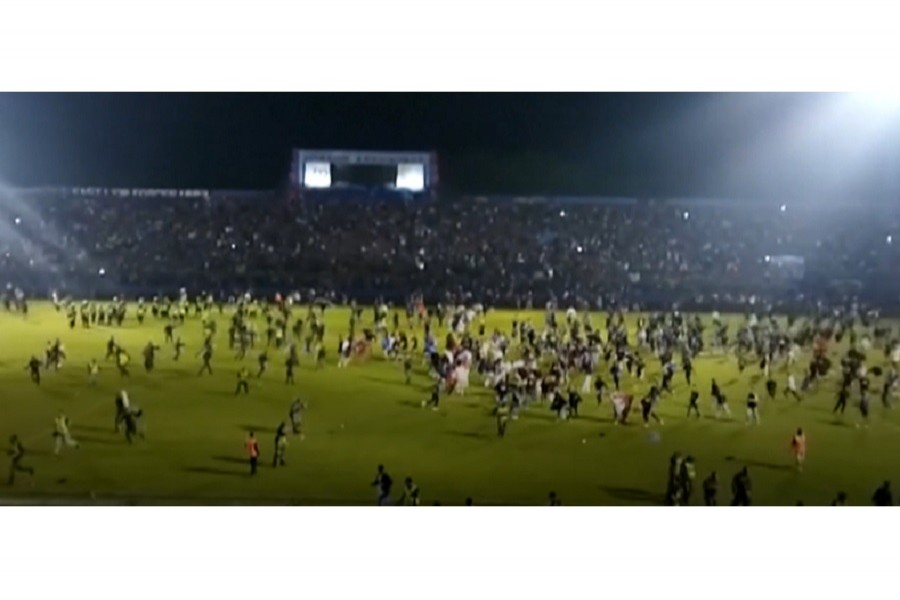Football fans "died in the arms" of players during a crush at Indonesia's Kanjuruhan stadium, the home team coach has said, as the number of children killed in the tragedy rose to 32.
Javier Roca said the crush at the match in Java, in which 125 people lost their lives, left him "mentally shattered".
Authorities say the youngest victim of Saturday's disaster was just three, according to BBC.
Some 18 officers are being investigated after police fired tear gas at fans who invaded the pitch when the match ended.
More than 320 other people were injured as supporters were trampled on and suffocated in crushes as they fled the gas. Indonesia's deputy minister of children and women affairs said the children were aged between three and 17.
An eyewitness told the BBC that police had fired numerous gas rounds "continuously and fast" after the situation with fans became "tense". Home team Arema FC supporters ran onto the pitch when the match ended in a 3-2 defeat to their rivals Persebaya Surabaya.
Videos on social media show fans clambering over fences to escape. Separate videos appeared to show lifeless bodies on the floor.
One witness, Chandra, told the BBC that a sea of smoke in the stands caused instant panic among spectators. "Little kids were crying, women were fainting, screams were heard everywhere, all were flocking out," he said.
Another fan, Eko, said he couldn't get out of the stand's exits due to the number of people trying to escape.
"I went back to the top of the stands with friends. Then I used a scarf to keep the smoke away. After that I jumped into the field and went down through the side door," he said.
Ester Andayanengtyas told the BBC her 17-year-old daughter Debora suffered serious injuries, including a broken neck and swelling on the brain during the panic.
"I asked her not to watch the game that day. She didn't return home, in the morning her friends were looking for her," Ms Andayanengtyas said. "We looked for her in the ER, but she wasn't there. The hospital told us to look at the mortuary. The confusion happened because my daughter didn't carry an ID."
Other witnesses reported hearing parents crying out "where is my child" among the chaos, and one man told the BBC that he saw parents collapsing while protecting their children.
"A mother fainted while hugging her child, next to her the boy fainted," he said. "Then some supporters picked up the mother and the boy to get out of the stadium. They didn't realise when they were carried it was because of tear gas."
Muhamad Dipo Maulana, 21, who was at the match, told BBC Indonesian that after the game had ended a few Arema fans went on the pitch to remonstrate with the home team players but were immediately intercepted by police and "beaten".
More spectators then took to the pitch in protest, the supporter said.
"Police with dogs, shields, and soldiers came forward," Mr Dipo told the BBC. He said he had heard more than 20 tear gas shots towards spectators at the stadium.
Police spokesperson Dedi Prasetyo told reporters that the officers under investigation "were responsible for holding" the weapons and said they were being questioned by an internal affairs team.
A police chief has now been sacked following the investigation.
He added that several other officers, including the field security team, and some officials from the Indonesian football league, were also under investigation.
Indonesia's human rights commission said it will conduct its own inquiry into the disaster, and President Joko Widodo has ordered that all matches in Indonesia's top league must be stopped until the official probe has been carried out.
Amnesty International said the police response amounted to "use of excessive force by the state" to control an unarmed crowd, and protesters in the capital Jakarta on Sunday night carried placards that read "stop police brutality".
Indonesia's police force has been previously criticised for its frequent use of tear gas in tightly-packed stadiums.
Meanwhile, Mr Roca, the Arema FC coach, told the Spanish broadcaster Cadena Ser that he thought "the police overstepped their mark" in efforts to control the crowd.
The announcement of the investigation comes after world football's governing body Fifa called the disaster "a dark day for all involved in football and a tragedy beyond comprehension".
Fifa's own regulations say no "crowd control gas" should be carried or used by stewards or police at matches and the body has requested a report on the incident from the Indonesian football federation.
Security Minister Mahfud MD wrote on Instagram that the stadium had been filled beyond capacity, with over 42,000 tickets being sold for the game in the 38,000 capacity stadium.
"It had gotten anarchic. They started attacking officers, they damaged cars," said Nico Afinta, police chief in East Java, adding that two police officers were among the dead.
"We would like to convey that... not all of them were anarchic. Only about 3,000 who entered the pitch," he said.
Fleeing fans "went out to one point at the exit. Then there was a build-up, in the process of accumulation there was shortness of breath, lack of oxygen", the officer added.


